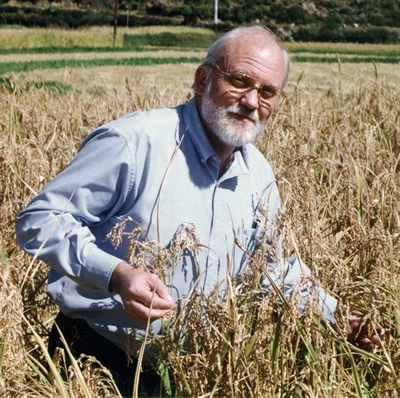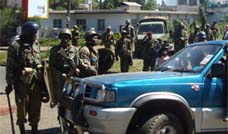
Despite the challenges, Zeigler, a U.S. native, is confident recent strides in research, technology and communication networks will help IRRI push another Green Revolution. Its scientists are developing new rice strains from a bank of more than 100,000 seed varieties stored in a refrigerator with walls thick enough to withstand a nuclear blast in Manila. A flood-resistant breed created from a rice variety developed in ancient India is able to survive up to 17 days of total submergence and will be available to producers next year. "Farmers have seen its performance in Bangladesh under real world flood conditions and they are clamouring for the seeds," said Zeigler, who saw the devastation of crop failure as a Peace Corps volunteer in the Congo.
Congo Kinsasha RPCV Dr. Robert Zeigler warns a global rice shortage is possible in the short run unless governments and farmers improve cultivation to squeeze more grain out of overworked paddy fields
Action needed to avoid rice shortages-top expert
* Reuters
* Thursday December 13 2007
By Carmel Crimmins
LOS BANOS, Philippines, Dec 13 (Reuters) - A global rice shortage is possible in the short run unless governments and farmers improve cultivation to squeeze more grain out of overworked paddy fields, a top world rice expert warned on Thursday.
"We are facing a problem and it's the poor who are going to be hit the most severely," Robert Zeigler, director general of the Philippines-based International Rice Research Institute (IRRI), told Reuters.
Boosted by rising populations and economic growth, the world is already eating more rice than is harvested annually and stocks are at their lowest levels since the early to mid-1970s, when food shortages triggered famine in some Asian countries.
Back then, IRRI came to the rescue with the Green Revolution: the development of high-yielding rice seeds that multiplied harvests of Asia's food staple and enabled economies such as China, India and Thailand to industrialise.
Now the world needs a sequel but the stakes are higher and the odds tougher.
Nearly half the planet's 6.6 billion people depend on rice to survive and demand for the grain is expected to increase 50 percent by 2030. Average rice prices have nearly doubled to around $325 per tonne in the past six years.
Yields, however, are plateauing as the urbanisation that the Green Revolution enabled shrinks available farmland and diverts water and labour away from production.
Demand for biofuels is also eating up resources and climate change is a potentially catastrophic threat.
Zeigler talks of a "perfect storm" of complications. Under his leadership, IRRI is trying to engineer a superstrength rice grain known as "C4" which will boost yields by as much as 50 percent.
But even the self-confessed hopeless optimist admits it will take at least three years to prove such engineering is possible and another seven to come up with a prototype.
In the meantime, Zeigler says farmers will have to squeeze more out of their land by managing pests better and improving their use of water and fertiliser to prevent the nightmare scenario of food shortages and rice at $1,000 a tonne.
Governments, who have cut funding for agriculture in favour of modern industry, will have to re-invest.
"We really have to make some short-term big pushes to increase the productivity of our intensive systems as a short-term gap-filling exercise," said Zeigler, speaking at IRRI's headquarters in the university town of Los Banos, south of Manila.
QUANTUM LEAP
Despite the challenges, Zeigler, a U.S. native, is confident recent strides in research, technology and communication networks will help IRRI push another Green Revolution.
Its scientists are developing new rice strains from a bank of more than 100,000 seed varieties stored in a refrigerator with walls thick enough to withstand a nuclear blast in Manila.
A flood-resistant breed created from a rice variety developed in ancient India is able to survive up to 17 days of total submergence and will be available to producers next year.
"Farmers have seen its performance in Bangladesh under real world flood conditions and they are clamouring for the seeds," said Zeigler, who saw the devastation of crop failure as a Peace Corps volunteer in the Congo.
"Our next trick coming will probably be salt-tolerance, further down the road we will be looking at drought tolerance and then heat tolerance."
For Zeigler, however, the only long-term solution to the increasing demand for rice is a quantum leap in yields.
Genetically modifying rice to make it more productive, the likely course that C4 would take, is still controversial in many countries and not everyone agrees such a tech-heavy solution is necessary.
But if a technological revolution is not undertaken, Zeigler, is clear what will happen: "The people will starve." (Reporting by Carmel Crimmins; Editing by Raju Gopalakrishnan and Jerry Norton)









